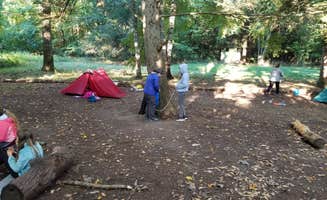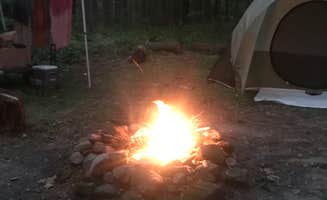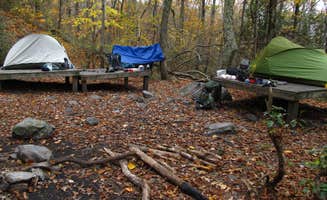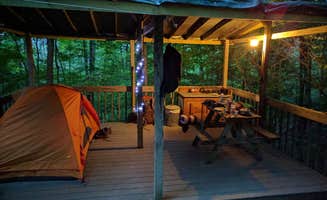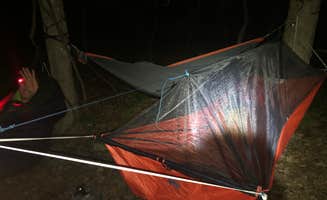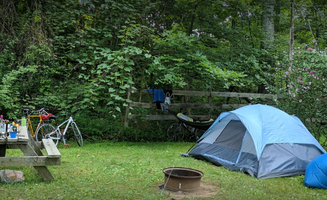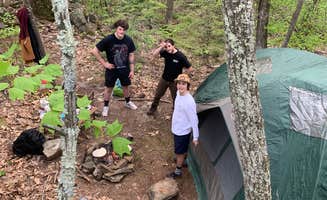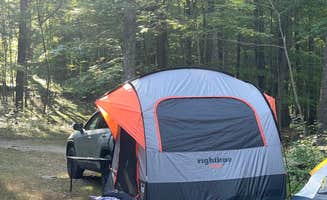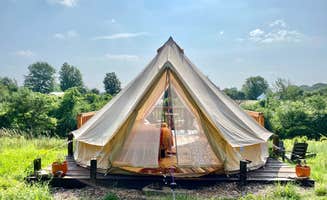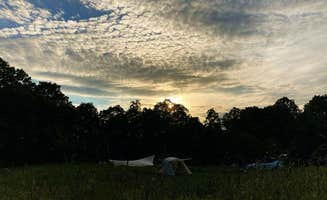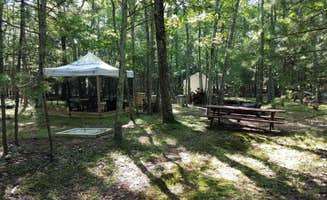Tent campsites near Kent, Connecticut offer backcountry experiences within the region's mountainous terrain that ranges from 500 to 2,300 feet in elevation. The area experiences distinct seasonal temperature variations with summer highs averaging 80°F and winter temperatures often dropping below freezing. Camping regulations typically require food storage in bear boxes, with multiple sites restricting access during winter months due to trail conditions.
What to do
Challenging hikes: Alander Trail offers steep terrain and rewarding views. "You have to park at the entrance and hike in about 1.5-2 miles with everything on your back to get to the spots," notes Kay D., who recommends being prepared for wildlife encounters: "We had some scares with coyotes and bears in the past but never anything crazy."
Water activities: Mountain Lakes Park features multiple lakes for recreation throughout the warm months. "A gorgeous piece of land that contains lakes, a lookout and Mt. Bailey, the highest point in Westchester County," writes Ben H. "A dirt road loops through the property with trails off and through it."
Rock climbing: Shawangunk Gateway Campground provides direct access to world-class climbing routes. "This is the closest campground to world renowned rock climbing in 'the gunks'," explains one reviewer. "People travel from all over the world to rock climb here. Most are experienced climbers and go on their own, but there are guide services in town if you're looking to get into the sport."
What campers like
Private settings: Laurel Ridge tent sites offer seclusion within the forest. "It's quite a hike to get to this dispersed campground, so be prepared! We packed on our backpacks early in the morning and arrived there mid-afternoon," shares Nora S. The reward is a "very beautiful view, and an awesome spot!"
Lean-to structures: Riga Lean-To provides shelter options for backpackers. "We absolutely loved this little lean-to next to Bear Mountain," says Nora S., adding that "Riga has the lean-to as well as about 4 or 5 sites all around. There's no picnic tables at the other spots but there is one for the lean-to."
Clean facilities: Even remote sites maintain sanitation standards. At Alander Trail, Liz P. observed, "Although we were the only campers at the time the area was emmaculate and not one piece of trash on the ground anywhere! The outhouse was even clean!"
What you should know
Fire regulations: Rules vary significantly by location. At Ten Mile River Shelter, fires are prohibited entirely, while Laurel Ridge also notes "No fires allowed." In contrast, Ward Pound Ridge permits fires in designated rings.
Reservation systems: Many sites require in-person booking. For Ward Pound Ridge Reservation, Paul R. advises, "The one downside is that you need to book in person but it can be done well in advance if need be."
Bear safety: Food storage requirements are strictly enforced. At Alander Trail Campground, "They give you a semi-flat area for a tent, a fire pit and grill rack, one picnic table, and a bear box you would be sharing with other campers nearby," explains Kay D.
Weather preparation: Sudden weather changes can impact camping experiences. At Brassie Brook, one camper reported their "trip was sadly cut short because we were freezing and it was raining a lot LOL but hey it's part of the experience."
Tips for camping with families
Accessible options: For families with young children, consider drive-in sites. Windmill Hill offers a "Quiet woods atmosphere with trail's. Wonderful place to camp. Very clean," according to Sara R., making it suitable for families seeking easier access.
Educational opportunities: Incorporate nature learning into your trip. Ward Pound Ridge features a "Trailside Nature Museum" that's "fun for the kids," notes Ming R., who adds there's "wide open space and the paths are well paved so kids can have fun riding the bikes or running around."
Safety considerations: Choose sites based on your family's experience level. Ward Pound Ridge offers "lean-to sites as well as tent sites. A maximum of eight people in two tents are allowed at each site," explains Ming R., though they caution "one picnic table seems to be inadequate" for larger groups.
Tips from RVers
Limited RV options: Most tent campsites near Kent don't accommodate large RVs. While some locations like Samuel F. Pryor III Shawangunk Gateway Campground technically allow RVs, Mollie R. notes as a pro that there are "No big RVs" at this tent-focused campground.
Alternative accommodations: Consider unique structures if traditional RVing isn't available. Mountain Lakes Park offers yurts as an option, which Ethan K. describes as "a fun option available at Mountain lakes is to rent a yurt to camp in," providing a middle ground between tent camping and RV amenities.


